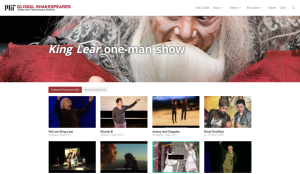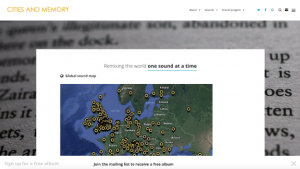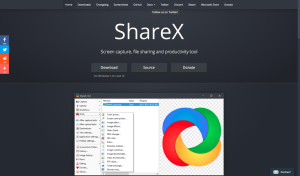Research and Education
Back to Top
|
 |
|
PodcastRE
|
Social studies |
|
As podcasting has exploded in popularity over the past decade, a number of researchers have become interested in studying this cultural phenomenon. PodcastRE (short for Podcast Research) is a searchable database of over 1000 different podcast feeds. These podcasts are curated, preserved, and cataloged by staff at the University of Wisconsin-Madison's Department of Communication Arts and the university's libraries. PodcastRE was founded by Jeremy Morris, a Communications Arts professor at the university. As of this write-up, this digital humanities archive provides links and metadata for over 150,000 individual audio files, some of which date back to 2007. Visitors may search the database and access its metadata and streaming options by conducting a keyword search. Upon conducting an initial search, the results may then be filtered into podcasts or episodes, and advanced search features such as episode length and date range become available. In addition, researchers can request a Researcher Account for access to additional resources, such as original audio files. While intended as an avenue of access to researchers interested in cultural and digital media, PodcastRE will also be of interest to avid podcast listeners. [JDC] |
|





|
|
 |
|
Environmental Humanities
|
Science |
|
Environmental Humanities is a peer-reviewed, open-access journal published by Duke University Press. The journal is edited by Thom Van Dooren, a professor of Gender of Cultural Studies at the University of Sydney, and Elizabeth DeLoughrey, an English professor at UCLA. Environmental Humanities publishes interdisciplinary scholarship, including work by scholars of the humanities and the natural and social sciences, to address environmental topics. This international journal began publication in 2012 and has published nine volumes to date. Recent articles explore conceptual ideas such as the politics of cancer and how the study of ice cores affects discourses of temporality. This journal also publishes the "Living Lexicon for the Environmental Humanities," a series of 1,000-word essays that explore and evaluate particular keywords. For instance, in one such essay, Serpil Opperman, an English scholar at Hacettepe University in Ankara, Turkey, considers how the term installation may "[open] a space to rethink the Anthropocene in terms of effective empathy for the Earth." Environmental Humanities would be of interest to scholars of many disciplines, from environmental studies to semiotics and beyond. [JDC] |
|





|
|
 |
|
MIT Global Shakespeares: Video & Performance Archive
|
Arts |
|
MIT Global Shakespeares: Video & Performance Archive offers online access to videos of Shakespeare's plays performed worldwide, both on stage and on film, as well as video interviews, written essays, and reviews of many productions. Viewers can browse this extensive collection by play, language, and geographic region. In addition, researchers can also conduct a keyword search. Full-length videos are available for many of the stage productions, and there are also short clips of film scenes. This collaborative project is directed and edited by Peter S. Donaldson, MIT's Ford International Professor in the Humanities, in collaboration with a team of regional editors at universities around the world. This archive is designed to "promote cross-cultural understanding and serve as a core resource for students, teachers, and researchers" and to celebrate Shakespeare as a truly global literary figure whose work can bridge cultures. [JDC] |
|





|
|
 |
|
Teaching Great Lakes Science
|
Science |
|
Michigan Sea Grant has produced a fantastic resource to help educators teach their students about Great Lakes science. Teaching Great Lakes Science offers fully-developed lesson plans and activities with accompanying data sets, all freely available and optimized for use in the classroom. These resources are targeted toward students in grades 4-12 and are designed so that teachers can choose to either use the complete module or to mix and match different components based on their instructional needs. Educators can browse these resources by concept (Earth Science, Life Science, Physical Science, Social Science) or by topic (e.g., fish, invasive species, water properties). These lessons and activities utilize guided inquiry to help students develop higher-level thinking skills. In the Teaching Tools section, educators will find tips for creating inquiry-based questions of their own. Another highlight of this resource is the Great Lakes FieldScope, a web-based geospatial tool developed in partnership with National Geographic Education Programs. In providing this excellent resource, Michigan Sea Grant aims to increase scientific and Great Lakes literacy in current and future generations. [JDC] |
|





|
|
 |
|
Bentham Project
|
Philosophy |
|
Jeremy Bentham was a philosopher, jurist, and social scientist best known for developing the philosophy of Utilitarianism. The University College in London is home to the Bentham Project, a collaborative effort that aims to "to produce a new scholarly edition of the works and correspondence of Jeremy Bentham." The project is currently headed by Phillip Schofield, a professor of the History of Legal and Political Thought at the university, with contributions from a number of UCL faculty and staff. Since 2010, the project has headed Transcribe Bentham, a crowdsourced effort to transcribe approximately 60,000 manuscripts. On the Transcription Desk page (available via Transcribe Bentham) interested visitors can select manuscripts to transcribe by subject matter (including animal welfare; crime and punishment; moral philosophy; and sexual morality), by time period, or by difficulty level. In addition, researchers can search or browse these manuscripts through a link in the Research Tools section. [MMB] |
|





|
|
 |
|
U.S. Army Corps of Engineers Digital Library
|
Social studies |
|
Academics, professionals, and engaged citizens alike can find much to interest them in the U.S. Army Corps of Engineers (USACE) Digital Library. This vast repository contains a wide range of material "by and about the U.S. Army Corps of Engineers" for varying audiences. These materials include technical reports, histories, photographs, maps, recreational guidebooks, and multimedia. This regularly updated library is well-organized, easy to search, and covers all the USACE Districts nationwide. Nearly all the materials on this site are freely available to the public for download, with the exception of the USACE's design materials, which are only available to USACE employees. Anyone interested in learning the specifics about a bridge, dam, or other construction projects under federal jurisdiction will find this resource greatly beneficial to their research. [JDC] |
|





|
|
 |
|
 |
|
Open Science Radio: English Episodes
|
Science |
|
Open Science Radio is a podcast dedicated to open-access science research and publishing that might interest scientists and information professionals. The podcast is hosted by Konrad Forstner, a biology researcher and professor of information literacy at the Technical University of Cologne, and Matthias Fromm, a podcaster and self-described "open science enthusiast." While some episodes of this podcast are in German, listeners can access all English-language episodes through the link above. In one recent episode, Forstner and Fromm chat with Jon Tennant, a paleontologist and open-science advocate, about his Open Science MOOC project. In another recent episode, Fromm chats with Felix Schoenbrodt, a psychology professor at Ludwig-Maximilians-University Munich, about creating incentives to encourage scientists to share their data. [MMB] |
|





|
|




















